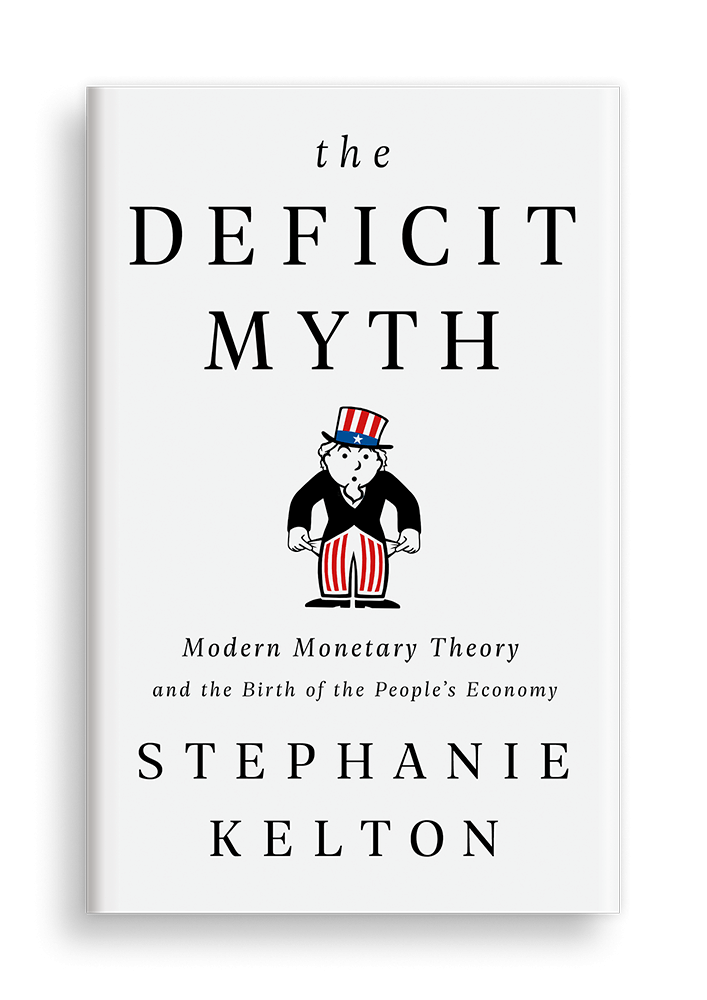Happy #BookBirthday to @StephanieKelton on the publication of her long-awaited "The Deficit Myth," a book that could NOT be more timely in this moment of massive structural unemployment and trillions of free money for the wealthiest among us.
https://stephaniekelton.com/book/
1/
https://stephaniekelton.com/book/
1/
Kelton is one of the leading proponents of #ModernMonetaryTheory, which describes how money actually works, as a series of accounting flows, and makes some profound observations about the implications of understanding how government spending actually works.
2/
2/
I've written about Kelton's work before:
https://pluralistic.net/2020/05/14/everybody-poops/#deficit-myth
But here's the shortest possible summary I can give:
Money ISSUERS (sovereign states) have a different relationship to money and debt than money USERS (everyone else: people, companies, local governments).
3/
https://pluralistic.net/2020/05/14/everybody-poops/#deficit-myth
But here's the shortest possible summary I can give:
Money ISSUERS (sovereign states) have a different relationship to money and debt than money USERS (everyone else: people, companies, local governments).
3/
Governments don't spend our taxes. Governments spend new money into existence and tax some of it back out of existence. Governments get new money from the same place Starbucks gets new gift-card codes: by typing entries into spreadsheets.
4/
4/
Governments aren't "monetarily constrained." If something is for sale in a currency the government prints, it can buy it. Governments are constrained by resources - that is, which things are for sale in its currency: labor, resources, manufacturing capacity.
5/
5/
Government "debts" aren't like household debts. If governments owe debts in their own currency, they can pay by creating more currency (it's different when the debts are in another currency: Venezuela can't pay US dollar debts by printing Venezuelan bolivars).
6/
6/
Government debts are where our money comes from. Governments spend money into existence: if they "balance their budgets" then they tax all that money back out again. That's why austerity ALWAYS leads to economic contraction - governments are taxing away too much money.
7/
7/
There's one other source of money, of course: bank loans. Banks have governments charters to loan money that they don't actually have on hand (contrary to what you've been taught, banks don't loan out their deposits).
8/
8/
When there's not enough government money in circulation, people seek bank loans to fill the gap. Unlike federal debts, bank loans turn a profit for bank investors. The more austerity, the more bank loans, the more profits for the finance sector (at everyone else's expense).
9/
9/
So talk of "fiscal responsibility" from business groups is just a pretence for creating the conditions in which they earn interest every time someone needs money that the government has withdrawn from the economy and has to pay financiers for it instead.
10/
10/
You can tell that business leaders don't really care about deficits: that's why they cheered the 2008 bailout, the #TaxScam, and the trillions that Congress has gifted to America's largest corporations since the crisis.
11/
11/
As Kelton pointed out in her recent interview with @marketplace, these firms know that deficits aren't necessarily inflationary - inflation is when there's more money than there are things for sale in that currency.
https://www.marketplace.org/shows/make-me-smart-with-kai-and-molly/maybe-modern-monetary-theory-is-an-answer-to-the-covid-19-economic-crisis/
12/
https://www.marketplace.org/shows/make-me-smart-with-kai-and-molly/maybe-modern-monetary-theory-is-an-answer-to-the-covid-19-economic-crisis/
12/
The pro-oligarch squad opposes government spending that makes everyday people better off because it makes it harder to coerce them into predatory loans and unfair working conditions - not because of inflation.
13/
13/
After all, today, 25-35% of our workers have no market for their labor - the private sector doesn't want that work. The feds could spend the money into existence to give each one of those workers meaningful employment doing care work and environmental remediation.
14/
14/
Forget the (laudable) goals of #FightFor15: the true US "minimum wage" is $0/hour, which is what the people who can't find work earn for their labor. A federal #JobsGuarantee would put a true floor under the price of labor in America.
15/
15/
Kelton writes superbly about this, with a flair that is rare among economists. To celebrate her book's publication, she's published an op-ed in the @nytimes: "Why I’m Not Worried About America’s Trillion-Dollar Deficits."
https://www.nytimes.com/2020/06/09/opinion/us-deficit-coronavirus.html
16/
https://www.nytimes.com/2020/06/09/opinion/us-deficit-coronavirus.html
16/
Like many of us, Kelton initially agreed with Margaret Thatcher's 1983 speech: "the state has no source of money other than the money people earn themselves. If the state wishes to spend more, it can only do so by borrowing your savings or by taxing you more."
17/
17/
But after Kelton read @wbmosler's "Soft Currency Economics," and discussed it with him in person, she had a profound realization about the true nature of money - and the needless cruelty and waste of austerity.
18/
18/
Her first published paper, 2016's "Do Taxes and Bonds Finance Government Spending?," was a landmark attempt to bring Mosler's ideas to academic economics.
https://www.tandfonline.com/doi/abs/10.1080/00213624.2000.11506296
19/
https://www.tandfonline.com/doi/abs/10.1080/00213624.2000.11506296
19/
Four years later, we're living in an MMT world, with Congress engaged in multitrillion dollar spending without any Pelosian "payfors" in sight.
20/
20/
Kelton: "Every economy faces a speed limit, regulated by the availability of its real productive resources — the state of technology and the quantity and quality of its land, workers, factories, machines and other materials."
21/
21/
"If any government tries to spend too much into an economy that’s running at full speed, inflation will accelerate. So there are limits. However, the limits are not in our government’s ability to spend money or to sustain large deficits."
22/
22/
"What MMT does is distinguish the real limits from wrongheaded, self-imposed constraints."
eof/
eof/

 Read on Twitter
Read on Twitter


